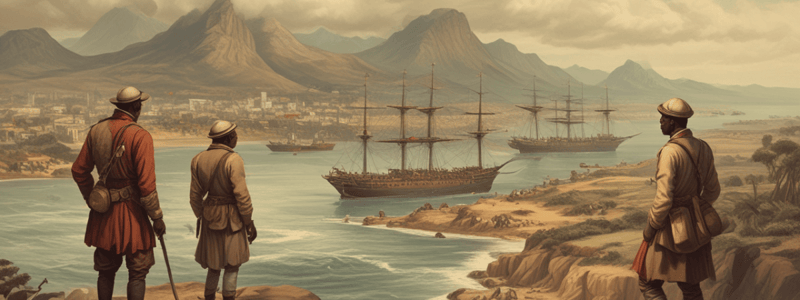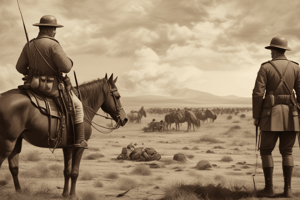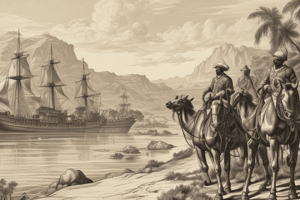Podcast
Questions and Answers
What was the primary reason for Britain's strategic control over the Zulu kingdom?
What was the primary reason for Britain's strategic control over the Zulu kingdom?
- To secure a labor force for the mines and plantations (correct)
- To annex more land for the British Empire
- To establish a military base
- To spread Christianity
What was the outcome of the Anglo-Zulu Wars?
What was the outcome of the Anglo-Zulu Wars?
- The Zulu kingdom was fragmented into smaller chiefdoms under British control (correct)
- The Zulu kingdom retained its autonomy
- The Zulu kingdom became a British protectorate
- The Zulu military defeated the British forces
What was the result of Cetshwayo's return in 1883?
What was the result of Cetshwayo's return in 1883?
- The reunification of the Zulu kingdom under British control
- A civil war among the Zulu, further weakening the kingdom (correct)
- A period of peace and stability in the Zulu kingdom
- The establishment of a new Zulu capital
What was the consequence of the disintegration of traditional Zulu life?
What was the consequence of the disintegration of traditional Zulu life?
What did the British do after conquering the Zulu kingdom?
What did the British do after conquering the Zulu kingdom?
What was the impact of the Anglo-Zulu Wars on the broader region?
What was the impact of the Anglo-Zulu Wars on the broader region?
What was the primary reason for British investment in South African natural resources in the late 19th century?
What was the primary reason for British investment in South African natural resources in the late 19th century?
Why did indigenous populations resist working in colonial economic ventures?
Why did indigenous populations resist working in colonial economic ventures?
What was the purpose of transforming independent chiefdoms into protectorates?
What was the purpose of transforming independent chiefdoms into protectorates?
Why did Britain import Indian laborers to work on sugarcane plantations?
Why did Britain import Indian laborers to work on sugarcane plantations?
What was the result of the importation of Indian laborers to Natal?
What was the result of the importation of Indian laborers to Natal?
What led to the expansion of mining in South Africa?
What led to the expansion of mining in South Africa?
What was the purpose of constructing railways from ports to mining areas?
What was the purpose of constructing railways from ports to mining areas?
What was the total number of Indian laborers imported to Natal between 1860 and 1911?
What was the total number of Indian laborers imported to Natal between 1860 and 1911?
What was the main reason for Britain's conquest of the Zulu kingdom?
What was the main reason for Britain's conquest of the Zulu kingdom?
What was the consequence of Cetshwayo's initial resistance against British demands?
What was the consequence of Cetshwayo's initial resistance against British demands?
What was the outcome of the fragmentation of the Zulu kingdom?
What was the outcome of the fragmentation of the Zulu kingdom?
What was the impact of forced labor on traditional Zulu life?
What was the impact of forced labor on traditional Zulu life?
What was the broader impact of the Anglo-Zulu Wars on African kingdoms?
What was the broader impact of the Anglo-Zulu Wars on African kingdoms?
What was the consequence of the civil war sparked by Cetshwayo's return in 1883?
What was the consequence of the civil war sparked by Cetshwayo's return in 1883?
What was a primary driver of the need for controlled labor in South Africa during the late 19th century?
What was a primary driver of the need for controlled labor in South Africa during the late 19th century?
What was the primary purpose of transforming independent chiefdoms into protectorates?
What was the primary purpose of transforming independent chiefdoms into protectorates?
What was the impact of the establishment of large-scale agricultural projects like sugarcane plantations?
What was the impact of the establishment of large-scale agricultural projects like sugarcane plantations?
What was the consequence of the discovery of coal and precious minerals like diamonds and gold?
What was the consequence of the discovery of coal and precious minerals like diamonds and gold?
What was the purpose of constructing railways from ports to mining areas?
What was the purpose of constructing railways from ports to mining areas?
Why were Indian laborers imported to work on sugarcane plantations?
Why were Indian laborers imported to work on sugarcane plantations?
What was a consequence of the importation of Indian laborers to Natal?
What was a consequence of the importation of Indian laborers to Natal?
What was the primary purpose of the British investment in South African natural resources?
What was the primary purpose of the British investment in South African natural resources?
What was the primary motivation behind Britain's desire to control the Zulu kingdom?
What was the primary motivation behind Britain's desire to control the Zulu kingdom?
What was the consequence of Cetshwayo's initial resistance against British demands?
What was the consequence of Cetshwayo's initial resistance against British demands?
What was the impact of the disintegration of traditional Zulu life on the Zulu population?
What was the impact of the disintegration of traditional Zulu life on the Zulu population?
What was the broader impact of the Anglo-Zulu Wars on African kingdoms?
What was the broader impact of the Anglo-Zulu Wars on African kingdoms?
What was the outcome of the post-war instability sparked by Cetshwayo's return in 1883?
What was the outcome of the post-war instability sparked by Cetshwayo's return in 1883?
What was the purpose of the British conquest of other African kingdoms like the Pedi?
What was the purpose of the British conquest of other African kingdoms like the Pedi?
What was a primary driver of the need for controlled labor in South Africa during the late 19th century?
What was a primary driver of the need for controlled labor in South Africa during the late 19th century?
What was the primary purpose of transforming independent chiefdoms into protectorates?
What was the primary purpose of transforming independent chiefdoms into protectorates?
What was a consequence of the establishment of large-scale agricultural projects like sugarcane plantations?
What was a consequence of the establishment of large-scale agricultural projects like sugarcane plantations?
What was the purpose of the construction of railways from ports to mining areas?
What was the purpose of the construction of railways from ports to mining areas?
Why were Indian laborers imported to work on sugarcane plantations?
Why were Indian laborers imported to work on sugarcane plantations?
What was a consequence of the importation of Indian laborers to Natal?
What was a consequence of the importation of Indian laborers to Natal?
What led to the expansion of mining in South Africa?
What led to the expansion of mining in South Africa?
What was the primary purpose of British investment in South African natural resources in the late 19th century?
What was the primary purpose of British investment in South African natural resources in the late 19th century?
What was the primary motivation behind Britain's desire to control the Zulu kingdom?
What was the primary motivation behind Britain's desire to control the Zulu kingdom?
What was the result of the eventual defeat of the Zulu forces at Ulundi?
What was the result of the eventual defeat of the Zulu forces at Ulundi?
What was the consequence of the disintegration of traditional Zulu life?
What was the consequence of the disintegration of traditional Zulu life?
What did Britain continue to do after conquering the Zulu kingdom?
What did Britain continue to do after conquering the Zulu kingdom?
What was the impact of the Anglo-Zulu Wars on the broader region?
What was the impact of the Anglo-Zulu Wars on the broader region?
Flashcards are hidden until you start studying




